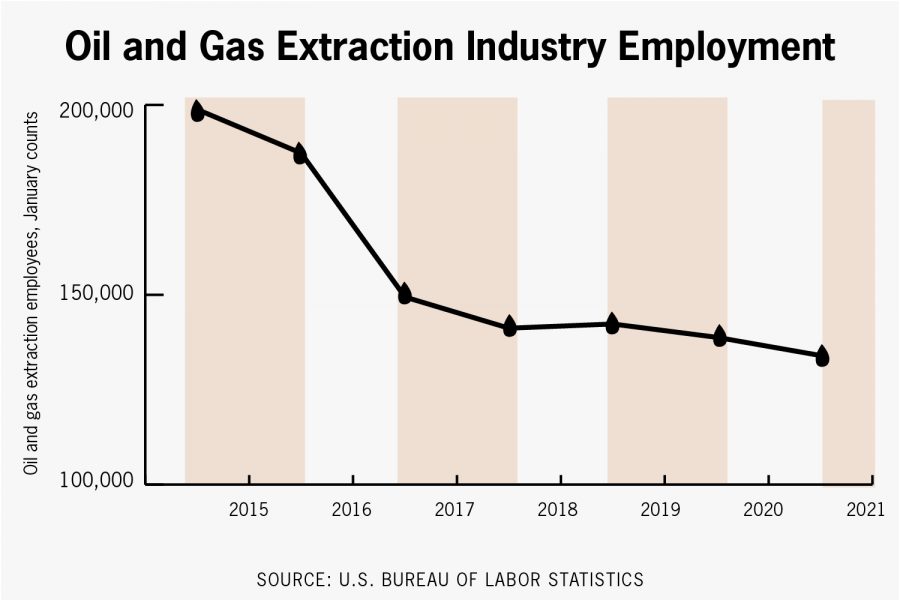Petroleum engineering students consider different career paths as market crashes
April 6, 2021
Editor’s Note: This article first appeared in the April 2 issue of The Daily Texan.
Stephen Clark had just gotten off the ski slope in New Mexico during spring break last year when his phone rang. With adrenaline still pumping through his veins, he answered.
His summer internship at Marathon Oil had just been canceled.
“It was devastating,” petroleum engineering senior Clark said. “I had just gotten done for the first time ever skiing, (which was an) exhilarating, fun experience, and I get the call saying that (my internship) had been canceled.”
Texas lost nearly 60,000 oil exploration and production jobs in 2020 after the COVID-19 pandemic lowered demand for crude and petroleum products. As a result, some students hoping to enter the once-booming industry have pursued further education or shifted career paths entirely.
After he graduates in May, Clark said he will shift his focus to the financial side of the industry and pursue a master’s degree in finance through McCombs.
“I’ve always had aspirations to eventually go to grad school, but I was planning to work first and save up some money, but that just didn’t fall into place,” Clark said.
Richard Chuchla, director of the Energy and Earth resources graduate program, said in 2014, about 70% of master’s level graduates were being hired by the oil and gas industry. Now, it’s only 30%.
The Global Energy Talent Index report estimates 78% of oil and gas employees feel less secure in their jobs now than they did a year ago, and two-thirds of them say COVID-19 caused their uncertainty.
“All these big companies have cut capital spending (due to COVID-19), which means you don’t need as many geoscientists … or petroleum engineers as you did before,” Chuchla said.
Chuchla said the industry has also been in a down cycle since 2015 due to the pressure of the climate crisis and the rise of renewable energy, also contributing to the decline in jobs.
Petroleum engineering senior Heidi Higginson said she applied to a wide variety of jobs in the oil industry, from business to data science. As a backup plan, she said she also plans on getting a certification to teach English abroad.
“I applied to a lot of random, nonpetroleum jobs just because I knew that the odds of me getting an internship were significantly lower this year than previous years,” Higginson said.
Despite the loss of oil jobs in the past year, Higginson said she would still like to go into the oil industry. As a petroleum engineer, she said she hopes to provide the world with energy in the cleanest way possible.
“There’s a bad stigma about oil and gas and petroleum engineers, but I want to encourage any environmentally-minded people to go into oil and gas,” Higginson said. “It’s really important to have people who value protecting the planet on the inside of the industry.”
Petroleum engineering junior Beatriz Torres’ father and brother both work in the oil industry. She said she planned to follow in their footsteps, but when she got rejected by all 100 of the internships she applied to her sophomore year, she said she had to consider other options.
“I’m very flexible. As long as I’m doing something that I like, or whatever they propose to me is something I can enjoy and has purpose, I can always transition and change,” Torres said.
When she chose her major, Torres was confident she wanted to go into the oil industry. But with fewer petroleum engineering jobs available, she said it’s hard to get the hands-on experience she needs to decide if this is still the career path for her.












